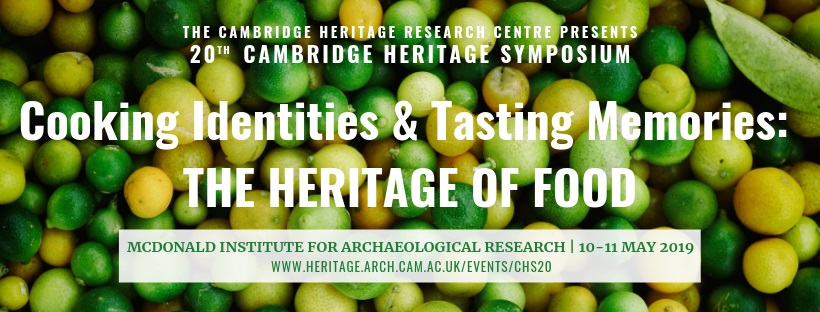In addition to its necessity for life, food serves as an unparalleled means through which to study the formation of identity within and between sociocultural groups. The embodied practices associated with cooking and the effect of taste as both a deeply individual and social experience bind groups together through space and time. This conference, by extension, aims to explore the role of tangible ingredients and foodstuffs and/or intangible foodways - defined as the cultural, social, and economic processes involved in the production and consumption of food - as cultural heritage at the individual, group and global levels.
Food and foodways transcend cultural and religious barriers, since trade throughout time has made many ingredients accessible to all. Further, the movement of foodstuffs and dishes has long been accompanied with the movement of people; urban centres are filled with restaurants of world cuisines, and food therefore often serves as one’s first glimpse into a foreign culture. Exploring and challenging how food is or becomes heritage and how, in turn, this shapes identities or cultural practices provides an avenue to appreciate difference while also demonstrating how all facets of food - its ingredients, preparation, and its consumption - can be unifying within and between cultures. The conference will be divided into three themes: Identity, the heritagisation of food, and ceremony.
Some of the key questions we seek to address include:
Identity:
1) How are the use of ingredients and the development of food practices determined at the intercultural and intracultural levels? How do parameters such as gender, class, geography, and religion determine food practices within and between cultures?
2) How do phenomena external to cultural practice including colonialism, armed conflict, migration, cultural/religious oppression, and climate change enable, limit and determine the use of ingredients, dishes and the development of foodways within a culture?
Heritagisation of food:
3) In a globalised world, can food and foodways be considered to have one “authentic” origin, granting it protected status in that place? How has the notion of place in the preservation of the tangible and intangible heritage associated with food been used or fallen into disuse?
4) How does heritage come to intersect with local food movements in efforts for more sustainable eating habits?
Ceremony:
5) How do daily, religious, and/or secular rituals become imbued through food practices? Who is responsible for the performance of food practices in the context of ceremony? How do such practices become heritagised?
Keynote Speakers
 |
Dr Emma-Jayne Abbots is Senior Lecturer in Anthropology at the University of Wales Trinity Saint David and Research Associate at the University of Exeter. Her research addresses the cultural politics of food and drink and the embodied production of food knowledges, with a particular focus on food, migration and craft. Further interests include: food work and labour relations; food, gender and intersectionality; biographies and story-telling; and eating, consumption and the senses. She recently led the AHRC funded project ‘Food Stories: Fostering Cross-Cultural Dialogue through Food’ and has conducted extensive ethnographic research in Ecuador and in the Welsh Marshes. In addition to a number of chapters and articles, Abbots’s academic works include the The Agency of Eating (Bloomsbury 2017), Why We Eat, How We Eat (with A. Lavis, Ashgate 2013) and Careful Eating (with A. Lavis & L. Attala, Ashgate 2015). |
 |
Professor Cristina Grasseni is Professor of Anthropology and Scientific Director of the Institute of Cultural Anthropology and Development Sociology at the University of Leiden (the Netherlands). She specialises in economic, political and visual anthropology. Her latest monograph, The Heritage Arena (2017) studies the politics of heritage food in the Italian Alps. |
 |
Dr Raúl Matta (Lima, 1979) is doctor in Sociology of the University of Paris – Sorbonne Nouvelle (2009). After postdoctoral stays at the Free University of Berlin and the Institut de Recherche pour le Développement (IRD, France) he led the projects "Food as Cultural Heritage", based at the University of Göttingen and funded by the German Research Foundation (DFG), as well as FoodHerit (a Critical and Comparative Research on Food Heritage and Gastropolitics), based at the IRD and funded by the French National Research Agency (ANR) between 2014 and 2017. In 2018, he joined Taylor's University in Kuala Lumpur, Malaysia, as Senior Lecturer. Since 2010, he has conducted critical research on the cultural, social and economic impact of food heritage-making and other cultural and political uses of food. His research interests, reflected in various journal articles and book chapters, include food studies, the anthropology of cultural heritage, and urban sociology. He is a member of the editorial board of the journal Anthropology of Food. |
Registration
Conference tickets includes tea and coffee breaks on each day of the conference. It also includes a wine tasting held on the evening of 10 May and lunch on 11 May. A conference dinner is available on 10 May (limited availability and optional) in Downing College.
Standard Conference Fee: £50
Student Conference Fee: £25
Conference Dinner: £40
Programme
A programme of speakers is now available to download here.
Registration for the Annual Heritage Symposium is now closed.

